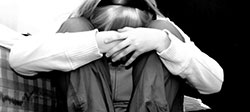
By Allyson Kraus, B.S. in Psychology
Graduate Assistant, Department of Human Development and Family Studies,
Colorado State University

Autism Spectrum Disorder (ASD) is characterized by a multitude of developmental deficits. One deficit includes challenging social interactions with other individuals. As a result, caregivers of children with ASD may have a difficult time teaching social skills. Children with ASD often have difficulty with turn-taking, perspective-taking, and emotional expression and recognition. These deficits make conversations with typically developing peers very difficult, and as such, children with ASD tend to often experience peer rejection. Research has found that although it may seem that children with ASD are not interested in making friends, the opposite is true. Children with ASD are interested in interacting, but they struggle to be successful in this realm. As a result, they tend to isolate themselves.
One intervention that is garnering attention is a group format for teaching social skills to children with ASD and other developmental disorders. Social skills groups are helpful because they are made up of children in similar situations, and it may be easier to practice skills with like-minded peers. A group format for social skills training has been found to be an effective model because it promotes interaction with peers and gives children a chance to practice in an understanding and accepting environment.
The Psychological Services Center at Colorado State University offers a social skills training group for children in kindergarten through fifth grade, and another group for adolescents, who struggle with social interaction. The group for adolescents provides members with the opportunity to learn social skills such as sportsmanship and flexibility, skills for decreasing anxiety, and skills for coping with bullying. Group members have a chance to practice their skills in naturalistic settings, such as a mall or a restaurant, with the help of supervising therapists. The group for children focuses on friendship skills, emotional expression and recognition, conflict management, and manners. This group is run by doctoral students in the Counseling Psychology program, and it is a discussion-based class that meets once a week for an hour to cover a range of topics.
The director of the Psychological Services Center, Dr. Lee Rosen, is the supervisor for the doctoral students running the group. Dr. Rosen specializes in child psychopathology, including disruptive behavior disorders, Attention Deficit Hyperactivity Disorder (ADHD), and Autism Spectrum Disorders. A diagnosis is not necessary for participation in the social skills groups, and group leaders meet with potential participants before the group begins to make sure that it is a good fit for the child and their family.
For more information, please contact the Psychological Services Center: 970-491-5212; or, click on their website: http://www.colostate.edu/Depts/Psychology/PSC/
Resources:
Rosen, L. Children's Social Skills Group: General Information. Psychological Services Center, CSU.
White, S. W., Keonig, K., & Scahill, L. (2007) Social skills development in children with Autism Spectrum Disorders: A review of the intervention research. Journal of Autism and Developmental Disorders, 37, 1858-1868.
Copyright © 2025 - All Rights Reserved - Colorado State University
CSU Extension | Equal Opportunity | Disclaimer | Privacy | Apply to CSU | CSU Home